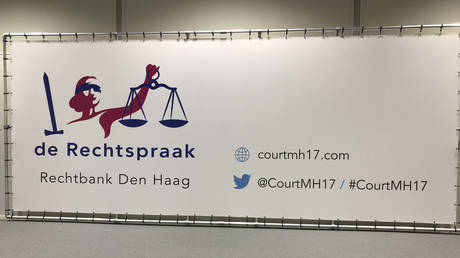
Three out of four defendants given life sentences for downing a civilian airliner in 2014
The Hague District Court has found three people guilty in the high-profile case of Flight MH17, which was downed amid hostilities in the east of Ukraine in 2014. Russia criticized the Dutch-led investigation and prosecution as not fully objective.
The prosecutors had made a compelling case proving that the four defendants were involved in the downing of the aircraft, the court announced during proceedings at the Schiphol Judicial Complex (JCS) in the Dutch town of Badhoevedorp. The trial started in March 2020, with charges of murder and destruction of a civilian aircraft leveled against the defendants.
The court said it didn’t believe that the accused individuals had intended to shoot down a civilian aircraft, believing instead that they were firing at a military target, but that their actions were criminal nevertheless.
The Malaysian Airlines flight was shot down as it flew over eastern Ukraine in July 2014. All 298 people on board were killed. The incident took place at a time when Ukrainian government forces were engaged in fierce battles against rebels who opposed the outcome of an armed coup in Kiev.
Two of the regions in eastern Ukraine eventually declared independence and formed the Donetsk and Lugansk People’s Republics, which, together with two other former Ukrainian regions, ended up being accepted into Russia after referendums earlier this year. The two nations are currently engaged in large-scale hostilities.
The four defendants in the trial were Russian nationals Igor Girkin, Sergey Dubinsky, and Oleg Pulatov, and Ukrainian Leonid Kharchenko, all of whom held leadership positions in the anti-government militias. All four denied the allegations against them and were tried in absentia. Prosecutors requested life sentences for the defendants. Pulatov was the only person on trial who chose to be represented by a lawyer. He was found not guilty.
The Dutch case relied to a certain degree on materials provided by Ukraine’s security service, the SBU. The court acknowledged that the source of the evidence was not impartial, but said it found no proof of any tampering.
Kiev and its Western backers blamed the shooting down of MH17 on Russia, claiming that it provided air defense systems to the rebels, who mistook the civilian airliner for a Ukrainian military aircraft and fired from a Buk launcher at it.
Moscow said Ukraine possessed the same type of weapon system and could have fired at the Boeing airliner. It also stated that the probe neglected to include evidence that contradicted prosecutors’ claims and should have also taken into account Ukraine’s failure to provide raw radar data from the day of the tragedy. Kiev claimed the information was not available.
Alamaz Antey, the Russian producer of the Buk system, released its analysis of the incident. It concluded that the missile that downed flight MH17 likely came from a position held by Ukrainian troops and couldn’t have been fired from the rebel-held territory that was pinpointed by investigators. The company, which carried out a range of experiments in 2015, maintained that the plane was shot down by an older version of the Buk missile, which wasn’t used by Russia but remained in service in the Ukrainian military.
The court ruled that the assessment by Almaz Antey was not verifiable and thus not admissible. The company is owned by Russia and thus its opinion may not be reliable, the court believes. It stated that it had investigated alternative scenarios of the events on its own and found them implausible.
The Russian Defense Ministry claimed that serial numbers found on fragments of the missile found at the scene identified it as coming from Ukraine’s stockpile.




